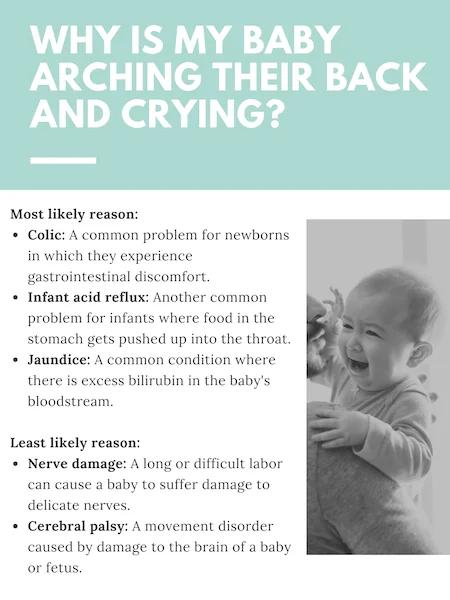Help Center
Online Resource Center for Information on Birth Injuries.
If you have a baby that often has an arched back and is crying when you hold her, or she is straightening her legs and screaming, it is easy to get worried. However, crying is a completely healthy and normal behavior for newborn infants. For most newborns, arching their backs and crying is perfectly fine and par for the course.
Particularly in the first several months of age, a baby cries in order to verbally communicate with his or her parents. As babies grow, they quickly develop other verbal and non-verbal communication tools, but early on, crying is the only effective tool infants have to talk to their parents.
Not all crying is the same. Infants deploy different types and levels of crying to communicate different things. Some crying is meant to signal that the baby is hungry. Other types of crying are meant to signal pain or discomfort. New parents usually pick up on these subtle crying differences very quickly.
Newborn infants will often cry because they are in discomfort or mild pain. Newborns have gas and other things that bother them, so pain crying is nothing to worry about. However, in rare cases, there is one particular type of “pain crying” that is cause for concern: arched back crying. If a baby appears to be arching its back while crying intensely or straightening her legs and screaming at night, it COULD be a sign of something abnormal. Back arching is a common reflex that babies exhibit when they suffer from very acute or strong pain.
So if a baby is flexing her back when she cries, it may be more than just the normal baby pains. Can infant back arching (with or without crying) be cause for concern? In an extremely small number of cases, arching the back is also an early symptom of spastic cerebral palsy, jaundice, autism, and other serious complications or signs of injury.
If you are concerned, read on. But remember the odds are overwhelming that there is nothing wrong with your baby. (Don’t skip past that last sentence. Digest it.)
Anything that causes a baby to experience significant pain or discomfort can trigger arched back crying. Your healthcare provider will perform diagnostic testing to determine what is causing your baby’s pain. Below is a list of some potential triggers. Keep in mind that the less serious causes are more likely.
Parents are alarmists. The proclivity to overreact comes with the job. It is not a bad thing. It keeps you vigilant. If you have a baby arching her back, keep an eye on it. But keep it in context too. The overwhelming likelihood is that you have a normal, happy, and healthy baby.
In the overwhelming majority of cases, arched-back crying is just a sign of colic or normal discomfort. The reason why we have a page on this is that in a very small percentage of cases arched back crying is one of the first signs of more serious issues.
The worst-case scenario with arched-back crying is that it is an indication that your baby has cerebral palsy as a result of brain damage from oxygen loss during delivery. If you had a completely normal and uneventful labor and delivery, then there is no reason to worry too much about arched-back crying.

In most cases, your baby’s back arching will resolve on its own as they gain better control over their body, learn to roll over, outgrow the startle reflex, and become more comfortable around others.
If an underlying health issue is causing your baby to arch their back, treating that condition should address the arching. For example, addressing common issues like gas and acid reflux can help reduce back stretching.
For normal gassiness and baby reflux, you can try simple, low-risk home remedies such as:
If your toddler arches their back and throws their head back during a temper tantrum, gentle behavior training might help. Teaching your child to express themselves in a less dramatic way could be beneficial. Ask your pediatrician for guidance.
Some babies who experience seizures may outgrow them naturally, but more serious causes of back arching may require physical therapy, medication, surgery, or other medical treatments.